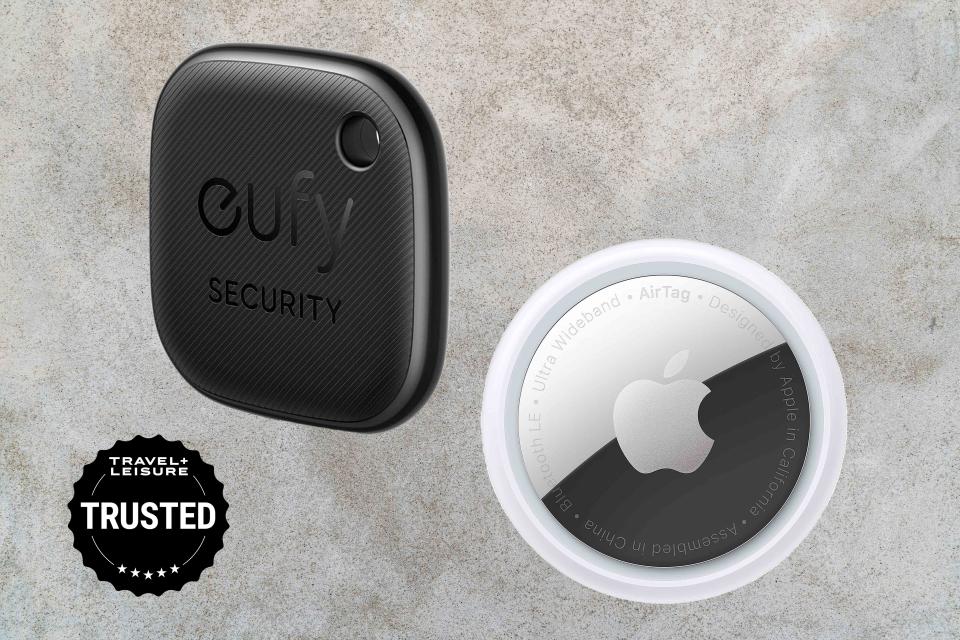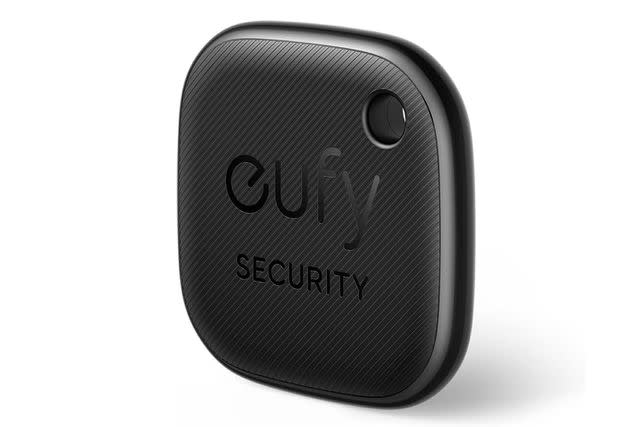The 3 Best Luggage Trackers of 2023, Tested and Reviewed
Dotdash Meredith and Yahoo Inc. may earn commission or revenue on some items through the links below.
Never lose luggage again with these easy-to-use tracking devices.

Travel + Leisure / David Hattan
Fact checked by Nick Blackmer
Losing luggage before (or after) a trip can put a damper on any experience. While there is no way to prevent airlines from misplacing your luggage, using a luggage tracker is one of the best travel hacks for making the process easier if your suitcase doesn’t make it on a flight.
To recommend the best luggage trackers on the market, we tested eight different devices from trusted tech brands. After flying with all of the luggage trackers, we chose the top three trackers that were effortless to set up, accurately located our luggage, and were extremely useful for offering peace of mind while traveling. Our top pick might surprise you, so keep reading to learn more about what qualities we looked for in a luggage tag.
Best Overall: Eufy SmartTrack Link

Why We Love It
It pairs seamlessly with an iPhone and costs much less than AirTags.
What to Consider
The locator sound on the device could be louder.
Eufy’s luggage tracker edged out the popular Apple AirTags during testing by impressing us with the same (if not slightly better) features at a much lower price point. The device came ready to go and all we had to do was open the Find My app on an iPhone and the tracker automatically connected for hassle-free setup. We used the tracker on four different flights and every time we could see that the luggage was on the airplane before take-off, providing peace of mind en route to our final destination.
The device itself is thin and small, but not too small that it could get lost easily, so you can feel safe using it in a wallet or purse on a trip. One of our favorite traits is the hole in the upper corner that can be directly attached to a keychain or lanyard to keep track of car or house keys instead. Plus, the tracker is water-resistant and didn’t get damaged during travels, even after we tucked it into the bottom of a 50-pound checked suitcase.
Price at time of publish: $14
The Details: 1.46 x 1.46 x 0.26 inches | Replaceable lithium coin battery | No subscription fee | iOS compatible only | Water resistant
Best for Everyday Use: Apple AirTag

Why We Love It
The device is about the size and weight of a quarter, which makes it easy to use to track all types of items.
What to Consider
We had some issues with location accuracy and false notifications of baggage being left behind.
The small size of an Apple AirTag is ideal for keeping track of your items without noticing the device is tucked away. Since the tags are about the size of a quarter, they can fit in a suitcase, purse, or wallet with ease, and the metal material feels particularly durable compared to the other plastic models we tried. Made by Apple, the device pairs to an iPhone within seconds and is tracked via the Find My app, where users can also change the name of the device if there is more than one. With the popularity of AirTags, there are tons of compatible accessories (beyond placing them in luggage), including passport covers, wallets, keychains, and wristbands for kids. The biggest downside we experienced with the AirTag is that it didn’t accurately provide the location of the luggage and it spooked us several times with messages saying that luggage was left behind while we were taxiing on the tarmac. Although the AirTag wasn’t our top pick, we still think it’s an excellent option to help prevent lost bags.
Price at time of publish: $29
The Details: 1.6 x 1.6 x 0.31 inches | Replaceable lithium coin batteries | No subscription fee | iOS compatible only
Related: The 10 Best Luggage Tags of 2023
Best Subscription: Tile Pro Bluetooth Tracker

Why We Love It
You can use this device to track items for free, but the paid subscription offers worthwhile features for some travelers.
What to Consider
The device requires the Tile app and it wasn’t very intuitive to navigate for setup.
The Tile Pro Bluetooth Tracker offers the same basic functionality as the other devices we tried, including the ability to see the location of the device on an app. However, frequent fliers will appreciate the ability to upgrade the features of this device by getting one of the two premium plans offered by Tile that cost $30 or $100 per year depending on the plan (you can get the first year for free when you purchase the tracker through Tile). The premium subscription comes with smart alerts to tell you when the device isn’t in range, 30-day location history, and reimbursement for lost items that Tile can’t track with options for $100 or $1,000 reimbursement for either the premium or premium protection plan.
For travelers who just want to use the Tile tracker as is, we were impressed with the durable and functional design of the plastic fob. It comes with a hole in it so you can use it for keys and wallets along with luggage, too. We had some slight issues setting up the device with the Tile app, but once we started messing around with it, it got easier to navigate over time.
Price at time of publish: $32
The Details: 2.32 x 1.32 x 0.3 inches | Replaceable lithium metal batteries | Subscription fee | Android, iOS, and Smart Home compatible | Water resistant
Other Luggage Trackers We Liked
The luggage tracker highlighted below didn’t quite make the cut, but we’re giving it an honorable mention after a solid performance in testing.
Dynotag Brushed Stainless Steel Smart Tag: This luggage tag isn’t technically a tracker since there isn’t a feature to locate the device, but if someone found it, the QR code would easily put them into contact with the owner of the luggage.
Our Testing Process
To test eight luggage trackers, we traveled with every device in a checked bag to see how well each one performed based on ease of use, functionality, accuracy, and design. We also tested some of the trackers for everyday use to keep track of wallets, keychains, and headphones.
First, we set up each device according to the instructions (or lack thereof) to see how easy or difficult it was to get started. After setting up the devices, we placed them in checked luggage and flew to various destinations, including routes with multiple layovers, to ensure our luggage made it onto the flights. In the end, our favorite luggage trackers were simple and intuitive to set up, accurately displayed the location of the item, and had a sleek and functional design meant for tracking luggage and other items while traveling.
Tips for Buying a Luggage Tracker
Make sure it’s compatible with your device
The tricky thing about buying a luggage tracker is that not all of them are compatible with all operating systems. In general, most trackers can connect with just iOS or Android, but there are a few options that can connect with both. It’s almost always listed in the specifications section of the product so you’ll want to double-check before purchasing a tracker.
Consider where and how you’ll be using it
Tracking devices are ideal for luggage, but they can also work well for keys, wallets, passports, purses, and more whether you’re on the road or at home. For travelers looking for a tracking device for wallets and passports, we recommend the Apple AirTag since there are tons of travel accessories made to hold the device and they are also slim enough to fit anywhere. For keys or AirPods, consider getting a tag with a hole designed for attaching the device to keychains or rings.
Frequently Asked Questions
How do luggage trackers work?
Luggage trackers use Bluetooth and GPS signaling to relay the location of the device back to a phone or tablet. Even if you’re thousands of miles away, the tracker can usually display a location on a map on your device, which is particularly useful if your luggage gets lost in transit.
Are luggage trackers allowed on planes?
Although luggage trackers often have lithium batteries, they are still allowed in checked and carry-on bags. The FAA doesn’t allow rechargeable lithium batteries with more than 100 watt hours per battery, but, luckily, tracking devices have less than that.
Why Trust Travel + Leisure
T+L commerce writer Anna Popp writes most of the team’s articles where all of the products were tested in our lab or in a real-world setting. She participated in this real-world test and she still uses her Eufy, Apple, and Tile tracking devices every time she flies. Anna combed through testing notes and used her expertise of almost always checking in a bag to recommend the best luggage trackers.
Related: The 6 Best Anti-theft Backpacks of 2023, Tested and Reviewed
Love a great deal? Sign up for our T+L Recommends newsletter and we'll send you our favorite travel products each week.
For more Travel & Leisure news, make sure to sign up for our newsletter!
Read the original article on Travel & Leisure.

